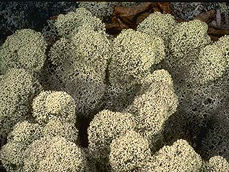Difference between revisions of "Lichen"
m (→Survivability) |
m (→Use) |
||
| Line 9: | Line 9: | ||
==Use== | ==Use== | ||
| − | Lichen is an important food source for reindeer and some species of [[moth]]. [ | + | Lichen is an important food source for reindeer and some species of [[moth]]. [https://en.wikipedia.org/wiki/Rock_tripe Rock tripe] is a species of that is eaten by humans, and is used in the cuisine of Korea. Chemicals produced by certain species are useful in [[medicine]] and industry. They are also important as they can slowly digest rocks, making their nutrients accessible to the biosphere. |
==References== | ==References== | ||
Latest revision as of 17:31, 25 July 2020
Lichen are symbiotic organisms containing both algae and fungi. The fungal cells provide structure and shelter for the algae. The algae, in turn, provide energy to the fungi through photosynthesis.
Survivability
Lichens can survive in some of the most barren and severe regions of the world. They tolerate extreme cold and dry conditions through dormancy and the ability to recover quickly when conditions are favorable. Although lichens can grow in regions with more rainfall, they actually require little rainfall to survive.[1]
The ESA launched lichen samples into Earth orbit, where they were exposed to the full vacuum of space for 14.6 days. Despite the intense radiation and vacuum, the samples returned alive and unharmed.[2]
Though it is unlikely that lichen can grow on the current surface of Mars, they will be some of the first organisms able to colonize durring terraforming. It may not be impossible for lichen to grow at some most favorable location on Mars. It has been reported that the lichen, Xanthoria elegans, maintained photosynthesis under simulated Mars conditions.[3]
Use
Lichen is an important food source for reindeer and some species of moth. Rock tripe is a species of that is eaten by humans, and is used in the cuisine of Korea. Chemicals produced by certain species are useful in medicine and industry. They are also important as they can slowly digest rocks, making their nutrients accessible to the biosphere.







